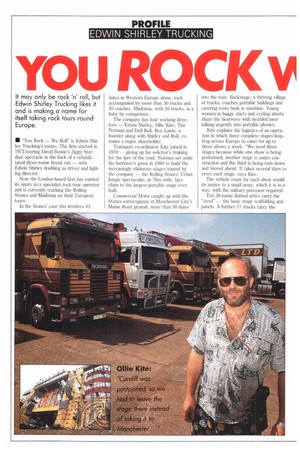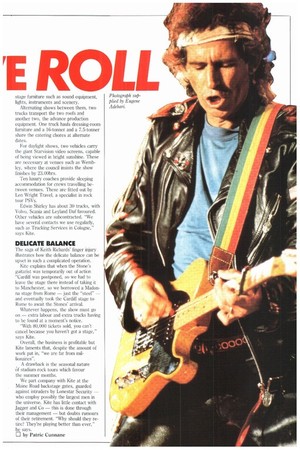YOU ROCK v
Page 32

Page 33

If you've noticed an error in this article please click here to report it so we can fix it.
FER It may only be rock 'n' roll, but Edwin Shirley Trucking likes it and is making a name for itself taking rock tours round Europe.
• "You Rock — We Roll" is Edwin Shirley Trucking's motto. The firm started in 1973 touring David Bowie's Ziggy Stardust spectacle in the back of a rehabilitated three-tonne bread van — with Edwin Shirley doubling as driver and lighting director.
Now the London-based firm has earned its spurs as a specialist rock-tour operator and is currently trucking the Rolling Stones and Madonna on their European tours.
In the Stones' case this involves 13 dates in Western Europe alone, each accompanied by more than 30 trucks and 10 coaches. Madonna, with 16 trucks, is a baby by comparison.
The company has four working directors — Edwin Shirley, 011ie Kite, Tim Norman and Dell Roll. Roy Lamb, a founder along with Shirley and Roll, remains a major shareholder.
Transport co-ordinator Kite joined in 1978 — giving up his solicitor's training for the lure of the road. Norman set aside his barrister's gown in 1980 to build the increasingly elaborate stages toured by the company — the Rolling Stones' Urban Jungle spectacular, at 76m wide, lays claim to the largest portable stage ever built.
Commercial Motor caught up with the Stones extravaganza at Manchester City's Maine Road ground, more than 30 dates into the .tour. Backstage, a thriving village of trucks, coaches portable buildings and catering tents bask in sunshine. Young women in baggy shirts and cycling shorts share the heatwave with bearded men talking urgently into portable phones.
Kite explains the logistics of an operation in which three complete stages leapfrog across Europe to cater for up to three shows a week. "We need three stages because while one show is being performed, another stage is under construction and the third is being torn down and moved ahead. It takes several days to erect each stage, says Kite.
The vehicle count for each show would do justice to a small army, which it is in a way, with the military precision required.
Ten 38-tonne flatbed artics carry the "steel" — the basic stage scaffolding and panels. A further 17 trucks carry the stage furniture such as sound equipment, lights, instruments and scenery.
Alternating shows between them, two trucks transport the two roofs and another two, the advance production equipment. One truck hauls dressing-room furniture and a 16-tonner and a 7.5-tonner share the catering chores at alternate dates.
For daylight shows, two vehicles carry the giant Starvision video screens, capable of being viewed in bright sunshine. These arc necessary at venues such as Wembley, where the council insists the show finishes by 23.00hrs.
Ten luxury coaches provide sleeping accommodation for crews travelling between venues. These are fitted out by Len Wright Travel, a specialist in rock tour l'SVs.
Edwin Shirley has about 30 trucks, with Volvo, Scania and Leyland Daf favoured. Other vehicles are subcontracted. "We have several contacts we use regularly, such as Trucking Services in Cologne," says Kite.
DELICATE BALANCE
The saga of Keith Richards' finger injury illustrates how the delicate balance can be upset in such a complicated operation.
Kite explains that when the Stone's guitarist was temporarily out of action "Cardiff was postponed, so we had to leave the stage there instead of taking it to Manchester, so we borrowed a Madonna stage from Rome — just the "steel" — and eventually took the Cardiff stage to Rome to await the Stones' arrival.
Whatever happens, the show must go on — extra labour and extra trucks having to be found at a moment's notice.
"With 80,000 tickets sold, you can't cancel because you haven't got a stage," says Kite.
Overall, the business is profitable but Kite laments that, despite the amount of work put in, "we are far from millionaires".
A drawback is the seasonal nature Of stadium rock tours which favour the summer months.
We part company with Kite at the Maine Road backstage gates, guarded against intruders by Lonestar Security — who employ possibly the largest men in the universe. Kite has little contact with Jagger and Co — this is done through their management — but doubts rumours of their retirement. "Why should they retire? They're playing better than ever," he says.
0 by Patric Cunnane
















































































